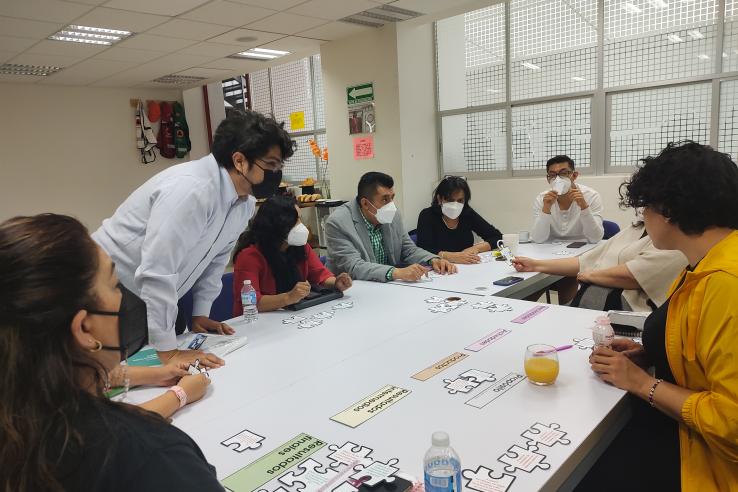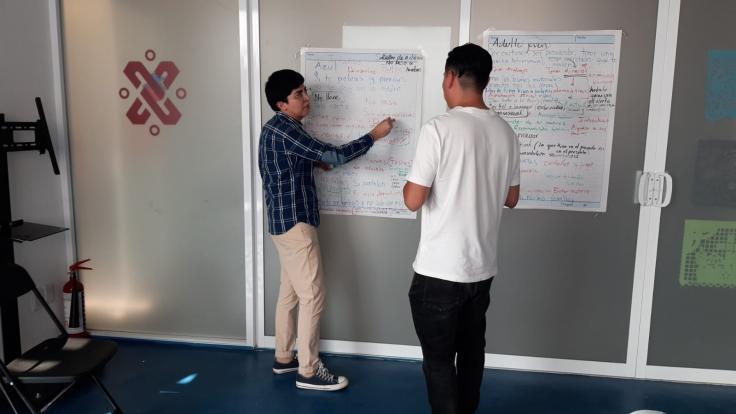Strengthening initiatives to support women facing violence through a government collaboration

Gender-based violence is a pressing public health and human rights challenge in Mexico. Since 2020, Mexico City’s Women’s Secretariat (SEMUJERES) has partnered with J-PAL affiliated researchers and J-PAL Latin America and the Caribbean (LAC) to strengthen its response. Drawing on evidence and tools shared by J-PAL LAC, SEMUJERES strengthened its conditional cash transfer program to more effectively support women facing violence, improved the collection and use of data, and developed a culture of evidence-informed decision-making. The team also piloted a new intervention with adult men to shift gender norms around masculinity and violence in local community centers.
The Problem
Gender-based violence in Mexico is widespread—policy solutions grounded in evidence can help.
Violence against women in Mexico is a significant public health and human rights issue. 70 percent of women over the age of 15 report experiencing at least one form of violence in their lifetime, including psychological, physical, sexual, or economic abuse. Specifically, 39 percent have faced violence from an intimate partner, 32 percent have experienced it in schools, and 28 percent in workplaces. 1 During the height of the Covid-19 pandemic, government-imposed lockdowns and health and financial stressors exacerbated an already critical situation. 2
In response, Mexico City’s Women’s Secretariat (SEMUJERES) was established in 2019 to promote and protect the rights of women and girls. SEMUJERES implements a range of programs for victims of gender-based violence (GBV), including working with civil society organizations to develop specialized shelters, as well as providing cash transfers and legal support. From its inception, the Secretariat has been committed to using scientific evidence to advance its mission of reducing GBV.
The Research
Drawing on evidence from randomized evaluations, J-PAL affiliated researchers and J-PAL LAC staff worked with SEMUJERES to improve its targeting and outreach of current programs, pilot a new intervention to shift harmful gender norms, and strengthen a cash transfer program for women facing GBV.
In early 2020, J-PAL Latin America began its partnership with SEMUJERES to support its commitment to improve public policy by using scientific evidence. J-PAL affiliates Gustavo Bobonis (University of Toronto), Manisha Shah (University of California, Berkeley, and invited researcher Clémentine Van Effenterre worked with the Secretariat to understand and address GBV in Mexico City.
Researchers supported SEMUJERES in improving data collection, identifying households, and prioritizing women’s safety. To identify households where SEMUJERES should target its programs, researchers reviewed hospitalization data and police records to identify hotspots characterized by high crime, drug use, and poverty. They also worked with SEMUJERES to develop tools for identifying potential victims of GBV without directly asking about their experiences, enabling safer in-home outreach. This was informed by the work of J-PAL affiliated researcher Erica Field (Duke University) in Peru. Since the pandemic, SEMUJERES has integrated these identification strategies into its operations.
Recognizing that existing policies in Mexico primarily address perpetrators of GBV through the criminal justice system, often as a punitive response after violence has occurred, the team identified a need to pilot programs that work to prevent GBV by involving men early on. Research by Manisha Shah and co-authors in Tanzania showed that a soccer-based intervention focused on educating adolescent boys to make better sexual and reproductive health choices, improved their attitudes toward violence and risky sexual behaviors. This ultimately led to a decline in reports of intimate partner violence by their female partners. 3 Drawing on this evidence, the team developed the Acá Entre Compas (Just Between the Guys) program, which was piloted across low-income neighborhoods in Mexico City. 4
The partnership with SEMUJERES deepened when J-PAL LAC also supported efforts to strengthen its conditional cash transfer (CCT) program targeting women facing violence. Cash transfers are among the most popular interventions to improve the socio-economic conditions of disadvantaged groups. However, cash transfers have been found, in some cases, to increase violence against women. 5
Recognizing this complexity, in December 2021, J-PAL LAC presented a review of evidence on the effect of cash transfers on women's well-being. Key to this evidence-sharing opportunity was a meta-analysis (authored by J-PAL affiliates Victoria Baranov and Lisa Cameron) which found that the bulk of the literature points to cash transfers either reducing or having no effect on physical and emotional intimate partner violence. 6
Some of the studies suggest that cash transfers reduce violence by alleviating the stress associated with financial insecurity and increasing women's bargaining power within the household. For instance, an evaluation in Ecuador (by J-PAL invited researcher Amber Peterman) found that when women received cash, vouchers, and food transfers, they not only experienced reductions in physical and sexual violence, but also allocated a higher share of household expenditures towards their children’s clothing. 7
Other studies suggested that combining transfers with interventions that transform gender norms and attitudes can reduce intimate partner violence more effectively than transfers alone. An evaluation in Bangladesh (by J-PAL invited researcher John Hoddinott) found that women who participated in a behavioral nutrition-focused program, in addition to receiving the cash transfer, experienced a reduction in physical violence. 8 These findings highlighted the importance of ensuring that cash transfer programs not only provide adequate financial support but also promote women’s empowerment.
From Research to Action
With support from J-PAL LAC, SEMUJERES piloted a new intervention with adult men to shift gender norms around masculinity and violence. SEMUJERES also strengthened its conditional cash transfer program—advocating to link the transfers to the minimum wage, institutionalizing surveys to measure beneficiaries' empowerment, and emphasizing the importance of support services within the program.
Building on Manisha Shah’s research in Tanzania, the researchers, J-PAL LAC, and SEMUJERES developed the Acá Entre Compas (Just Between the Guys) program, which targeted adult men between the ages of 18 and 45 to participate in group sessions focused on challenging dominant gender norms and preventing violent behaviors. The 12-week sessions were offered by a team of facilitators in community centers across low-income neighborhoods in Mexico City to groups of up to ten men.
J-PAL LAC is now exploring opportunities to further test the program model to enhance its targeting and scale, and collaborate with government institutions that are leading efforts to reshape gender norms.

Photo Credit: Verónica Reyes
The evidence shared by J-PAL LAC also catalyzed changes to how SEMUJERES delivers its conditional cash transfers (CCT).
A key change to the CCT program was the official linkage of the cash transfer amount to the minimum wage. While the transfer had previously matched the minimum wage, in 2022, the Congress in Mexico City proposed keeping the payment fixed at its 2021 value and breaking the link to future changes in the minimum wage. To support SEMUJERES in its advocacy to maintain the linkage, J-PAL LAC analyzed the incomes of CCT recipients and found that they were below the national average. Maintaining the link to the minimum wage would therefore allow beneficiaries to reach the average income level in Mexico for a short period, providing greater financial security.
This analysis played an important role in supporting SEMUJERES’ advocacy efforts and ultimately influenced the Congress’s decision to continue tying the cash transfer amount to the minimum wage. The CCT’s 2022 operational rules now explicitly recognizes the role of a minimum wage in improving the living conditions of recipients.
Prior to the partnership with J-PAL LAC, SEMUJERES tracked the mental health of CCT recipients through monthly assessments conducted by psychologists. To complement this, J-PAL LAC shared a J-PAL resource that outlines ways to measure women’s empowerment which led SEMUJERES to implement surveys to measure empowerment at the start and end of the six-month cash transfer period.
SEMUJERES conducted these surveys for all beneficiaries in 2022 and 2023, tracking indicators such as self-perceived well-being, use of the cash transfer, and satisfaction with program services. This data was then used to conduct internal evaluations and the revamped survey was officially institutionalized in the CCT’s 2024 operational rules. SEMUJERES is now exploring ways to expand the use of these surveys in other government services, such as police stations and the judiciary, to further strengthen its GBV response.
Evidence also suggests that combining cash transfers with interventions that address gender norms can more effectively reduce intimate partner violence. Reflecting this, the CCT program has included complementary support, such as social, psychological, and legal services, to help victims exit the cycle of violence. Through the surveys developed in collaboration with J-PAL LAC, SEMUJERES gained deeper insights into the importance of these complementary services. The CCT program now emphasizes access to judicial support when needed by its recipients, including legal guidance on initiating criminal investigations for GBV, provided through the Abogadas de las Mujeres program. SEMUJERES is also exploring ways to connect CCT beneficiaries to formal employment opportunities and the education system.
During the partnership, SEMUJERES expanded the reach of the cash transfer program from 500 to 1,100 women in Mexico City. The program continues to provide cash transfers at the level of the minimum wage, emphasizes complementary support services, and uses data from empowerment surveys to inform and strengthen its operations.
Dulce Colín, General Director for Gender Equality at SEMUJERES, has played a pivotal role in integrating evidence into policy and driving institutional change. Reflecting on the collaboration, Dulce noted that J-PAL played an important role in identifying tools to strengthen evidence-based decision-making, aligning with the broader focus on evidence use within the Government of Mexico City. J-PAL LAC also helped SEMUJERES deal with early challenges, like the time and technical capacity needed to collect data regularly. They showed that even small changes, like using existing data more effectively, can make programs work better.
While J-PAL LAC’s collaboration with SEMUJERES started as a research engagement to improve targeting and measurement during the Covid-19 pandemic, it ultimately led to a broader shift in SEMUJERES’s approach to addressing GBV. The collaboration led to tangible changes in the cash transfer program and helped build a foundation for more consistent use of data and evidence across the Secretariat’s work. This partnership reflects the importance of having strong evidence champions and long-standing collaborations in translating evidence into policy.
Abdul Latif Jameel Poverty Action Lab (J-PAL). 2025. "Strengthening initiatives to support women facing violence through a government collaboration." J-PAL Evidence to Policy Case Study. Last modified October 2025.
INEGI. 2021. National Survey on the Dynamics of Household Relationships. Aguascalientes: INEGI.
Zhang, Dongling, and Diana Scharff Peterson. 2023. “International Responses to Gendered-Based Domestic Violence.” Taylor & Francis.
Shah, Manisha, Jennifer Seager, Joao Montalvao, and Markus Goldstein. 2023. “Sex, Power, and Adolescence: Intimate Partner Violence and Sexual Behaviors.” NBER Working Papers 31624, National Bureau of Economic Research, Inc.
This program was inspired by Mexico City’s Gendes program that targets men who have appeared in court for domestic violence, but have not faced punitive action, providing them with psychological support to reduce violent behaviors.
Baranov, Victoria, Lisa Cameron, Diana Contreras Suarez, and Claire Thibout. 2020. ”Theoretical Underpinnings and Meta-analysis of the Effects of Cash Transfers on Intimate Partner Violence in Low- and Middle-Income Countries.” The Journal of Development Studies, 57(1), 1–25.
Baranov, Victoria, Lisa Cameron, Diana Contreras Suarez, and Claire Thibout. 2020. ”Theoretical Underpinnings and Meta-analysis of the Effects of Cash Transfers on Intimate Partner Violence in Low- and Middle-Income Countries.” The Journal of Development Studies, 57(1), 1–25.
Hidrobo, Melissa, Amber Peterman, and Lori Heise. 2016. “The Effect of Cash, Vouchers, and Food Transfers on Intimate Partner Violence: Evidence from a Randomized Experiment in Northern Ecuador.” American Economic Journal: Applied Economics, 8 (3): 284–303.
Roy, Shalini, Melissa Hidrobo, John Hoddinott, and Akhter Ahmed. 2019. “Transfers, Behavior Change Communication, and Intimate Partner Violence: Postprogram Evidence from Rural Bangladesh”. The Review of Economics and Statistics 2019; 101 (5): 865–877.